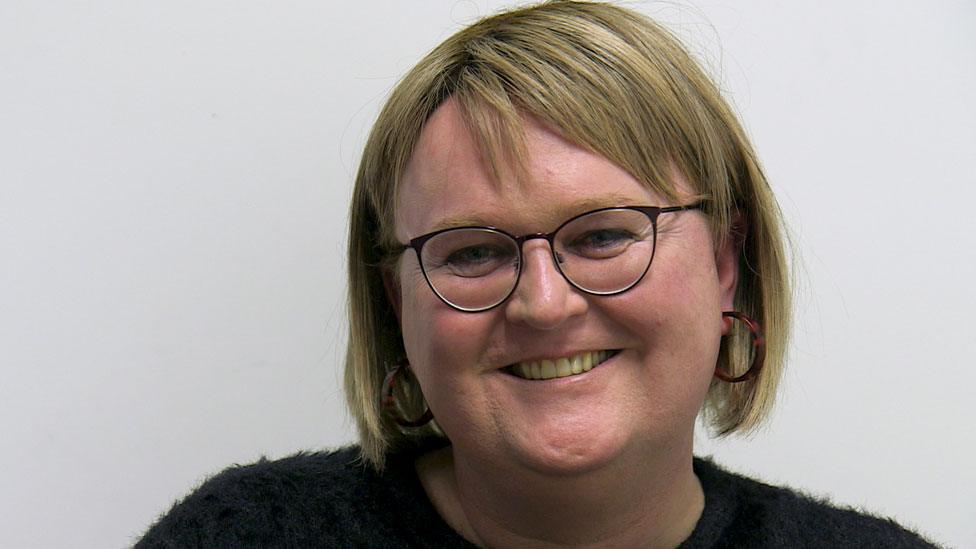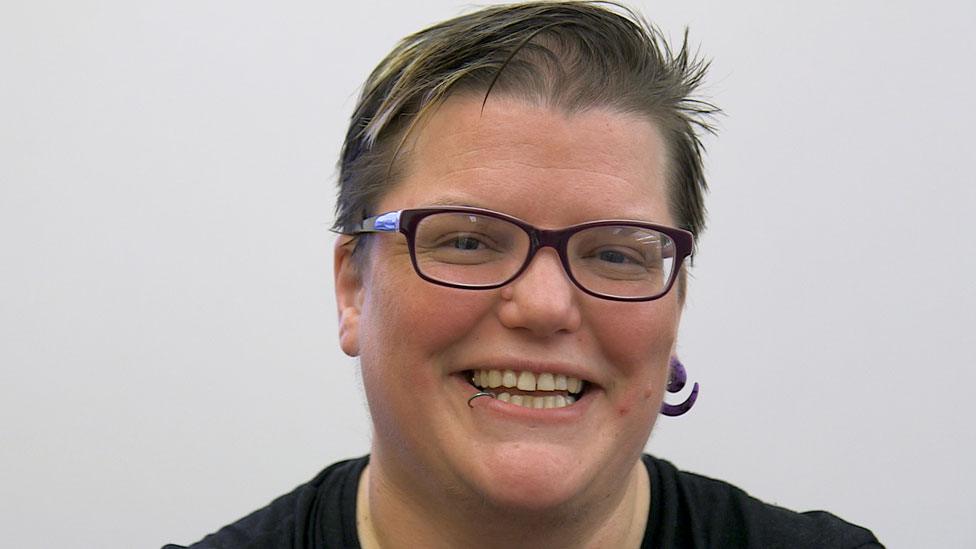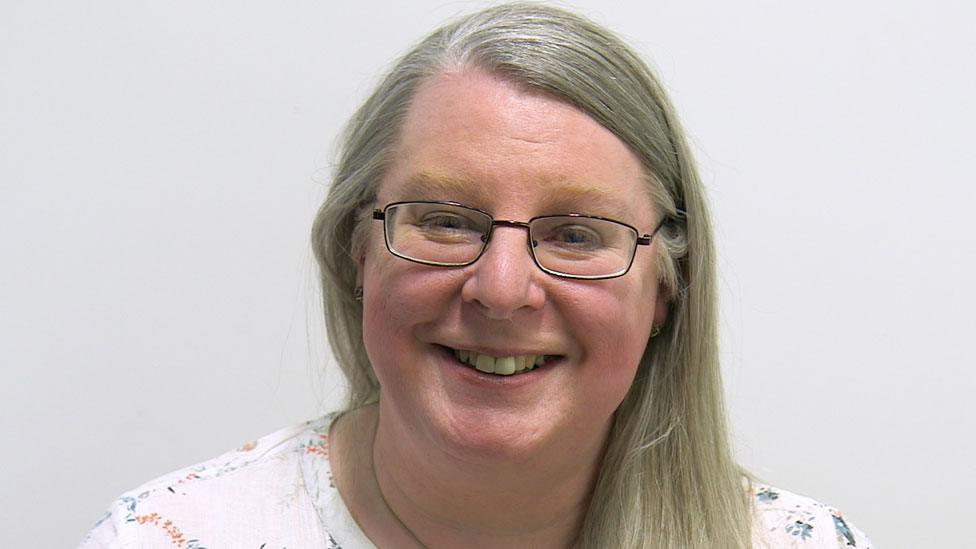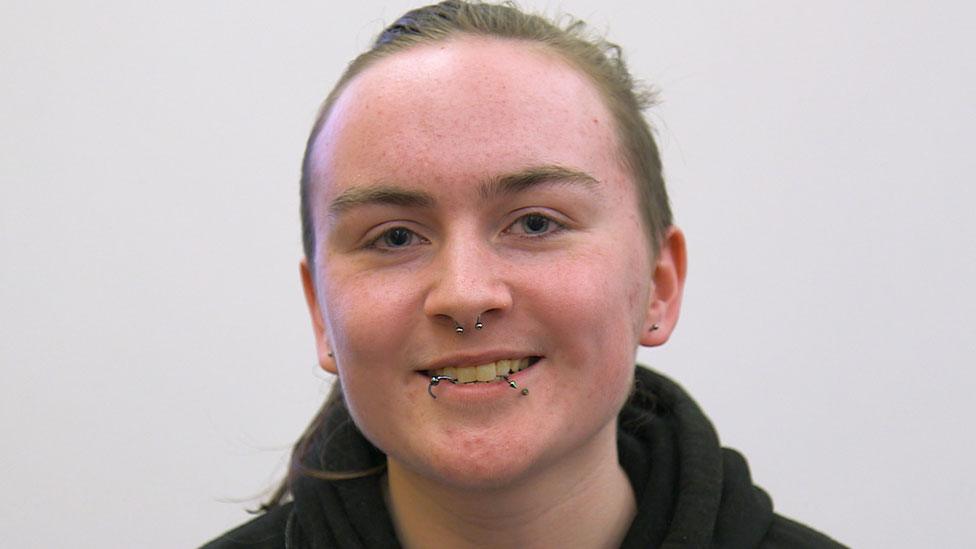How do trans people choose their name?
- Published
How do trans people choose their name?
Imagine living with a name that is not quite right - but you have the chance to change it.
Selecting a new name is often an important part of the transition process for trans people. But many struggle with the decision and ponder for years on what to choose.
We speak to four people from Scotland who have taken the name-change journey.
Carrie - 'Picking the kids' names was easier'

Carrie Marshall: "Carrie fitted the bill, and it's the name of some really amazing women"
Tech journalist Carrie Marshall came out as a trans woman at 44.
She says: "Being called my old name when I was being me started to become excruciatingly embarrassing. You don't meet many women called Gary."
But choosing another name was not easy and it took over a year before she landed on Carrie.
"I tried to find a name that would fit me and that's a lot harder than you think it would be. I've got two kids and we came up with names for them and that was quite easy compared to this," she jokes.
She was looking for something that did not feel too young, was easy to pronounce ("which ruled out Gaelic names for me," she adds) and was not too dissimilar from her former name.
"Carrie fitted the bill, and it's the name of some really amazing women such as the actress Carrie Fisher and the musician Carrie Brownstein.
"It's also the name of a horror movie in which Carrie is bullied at school and wreaks terrible revenge. That seemed appropriate too."
But opting for something so similar does not solve all the problems you might face. Even grabbing a cup of coffee can cause problems.
"I'll say Carrie and they'll say 'Karen?' And I say no, Carrie. And we'll go through all of these names and we'll finally agree that it's Carrie, with a C, like the actor Carrie Fisher.
"And then I'll get my coffee and it says Harry," says Carrie, who lives in Glasgow.
What is a "deadname"? It's the term given by trans people to the name they were originally assigned before they changed it. Some transgender people find the use of this name upsetting. All the examples in the article were a personal choice by the participants.
Dylan - 'I was on a bus when the name came to me'

Dylan Falconer: "It feels like I've moved on. That part of my life has died in a sense."
It was Carrie Fisher who inspired Carrie, and for Dylan Falconer it was Bob Dylan who was the big influence.
"I was sat one day on the bus, thinking how sad it was that Leonard Cohen had died and then thought about Dylan and the name stuck."
Dylan is a non-binary person living in Edinburgh.
This means they do not feel that either the male or female label fits who they are, and they use gender neutral pronouns to reflect this - they and them.
Choosing a name was an important step in Dylan's self-discovery.
Dylan says: "I had come to terms with the fact I was non-binary but felt I couldn't move any further forward until I had a name. Once I had the name, it was liberating.
"I felt more like I was taking steps to become me."
Dylan did consider choosing a name similar to their "deadname" - this means the name given to them at birth - but nothing resonated.
And now, when Dylan occasionally receives items in the post sent to their deadname, it can be "quite a triggering thing".
"It feels like I've moved on. That part of my life has died in a sense. I'm very disconnected from that life now."
Why use they and not she or he? People who do not exclusively identify themselves as masculine or feminine, or identify as both, accept "they" as a gender neutral description.
Elaine: 'It took me a long time to get used to it'

Elaine Gallagher: "I felt as if Elaine was an aspect of a person who also included Michael."
Cultural interests also proved useful for Elaine Gallagher, a writer and poet in Glasgow.
She was able to test out her gender identity via online gaming. Elaine came out as a trans woman at 40, but before a virtual world enabled her to play female characters for years.
First she was Amélie, then Elinor, and finally, Elaine became Elaine.
The switch to being Elaine full time was difficult and long, she says, adding at first she "fought against" identifying as trans largely because she did not want to lose her family.
For a period of around five years, she was known as Elaine in some circles but Mike in others.
"I felt as if Elaine was an aspect of a person who also included Michael, but that turned out to be a really difficult concept for people."
She adds: "It took me a long time to actually get used to having the name Elaine, to going by it. I went by Mike and Michael for 45 years until then."
Rather than totally abandoning her former name, Elaine decided to take on a feminised version of it for her middle name.
So she became Elaine Michelle.
What is a gender recognition certificate (GRC)?, external It's a publicly issued document that, if granted, enables an individual to obtain a new birth, marriage or civil partnership certificates. However, many in the trans community are critical of the process of getting a GRC, saying it is too obtrusive and should not require a medical diagnosis.
Kaden - 'Names should feel like a gift'

Kaden Aodhagán Stewart: "The meaning [of Aodhagán] also helped as it means fire or little fire and my first name means fighter."
Creating a middle name was also meaningful for Kaden Aodhagán Stewart, a student from Fife.
He does not recall how he ended up with Kaden specifically, but "it just feels right".
Much more thought was given to picking Aodhagán. It was important for it to reflect his Gaelic heritage.
"The meaning also helped as it means fire or little fire and my first name means fighter.
"These things represent important parts of personality and my journey, and so eventually the meaning and heritage made me choose my middle name. I'm very proud of it."
While he is non-binary, Kaden chose masculine names and uses male pronouns because he feels closer to the male end of the gender spectrum.
Kaden came out to his family at 16, and it took a long time for them to process the name change.
The lack of explanation as to how Kaden came about has been remarked on: "I think most people wanted to know where it came from, at least my first name, which was difficult for me because I never could give them a straight answer. I just knew."
But it was not difficult for everyone, including his best friend.
Kaden recalls: "We were speaking about it and they were telling me that they used to forget my deadname all the time but as soon as I told them my name was Kaden, they remembered it. It felt like fate."
He also believes names should feel like a gift - whether from your parents or from yourself.
"Gifts are supposed to be something that make you happy, they're supposed to be something you treasure and enjoy," he says.
"If you find that your name isn't the kind of gift it's supposed to be, you should be able to gift yourself one and give yourself something that makes you feel special."
How easy is it to legally change your gender? You can begin using a new name at any point. It can take more than five years for trans men and women to legally change their gender under the current system.